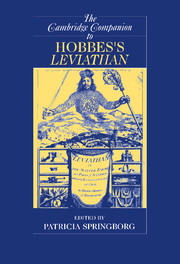Book contents
- Frontmatter
- General Introduction
- Part I: Of Man
- Part II: Of Commonwealth
- Part III: Of a Christian Commonwealth
- Part IV: Of the Kingdom of Darkness
- 14 Hobbes’s Critique of the Doctrine of Essences and Its Sources
- 15 Leviathan and Its Anglican Context
- 16 The Bible and Protestantism in Leviathan
- 17 The 1668 Appendix and Hobbes’s Theological Project
- Part V: Hobbes’s Reception
- Bibliography
- Index
- Series List
17 - The 1668 Appendix and Hobbes’s Theological Project
from Part IV: - Of the Kingdom of Darkness
Published online by Cambridge University Press: 28 November 2007
- Frontmatter
- General Introduction
- Part I: Of Man
- Part II: Of Commonwealth
- Part III: Of a Christian Commonwealth
- Part IV: Of the Kingdom of Darkness
- 14 Hobbes’s Critique of the Doctrine of Essences and Its Sources
- 15 Leviathan and Its Anglican Context
- 16 The Bible and Protestantism in Leviathan
- 17 The 1668 Appendix and Hobbes’s Theological Project
- Part V: Hobbes’s Reception
- Bibliography
- Index
- Series List
Summary
INTRODUCTION: PLACING THE 1668 APPENDIX IN CONTEXT
The possibility of a translation into Latin or French of Leviathan, his masterpiece of political philosophy, had engaged the attention of Thomas Hobbes not long after its appearance in English in 1651. Du Verdus gave various, and not necessarily consistent, reports of such an undertaking. Writing in 1654 to say he was making an interlinear translation and again in 1655 to express his hope of translating Leviathan into French, in 1656 and again in 1657 Du Verdus wrote with a promise of an exact translation. In 1657 De Martel wrote seeking a translation, followed by du Bosc in 1659, the latter noting, 'All ye learned men I know desire that Leviathan were in French or Latine'. Similar requests followed.
This expression of interest from non-Anglophone admirers might suggest that the eventual volume of 1668 would be aimed at a readership significantly different from that addressed in 1651, and to an extent this is true, as Hobbes himself indicated in later noting that he had omitted from the 1668 volume 'some such passages as strangers are not concerned in'.
- Type
- Chapter
- Information
- The Cambridge Companion to Hobbes's Leviathan , pp. 392 - 410Publisher: Cambridge University PressPrint publication year: 2007
- 5
- Cited by



